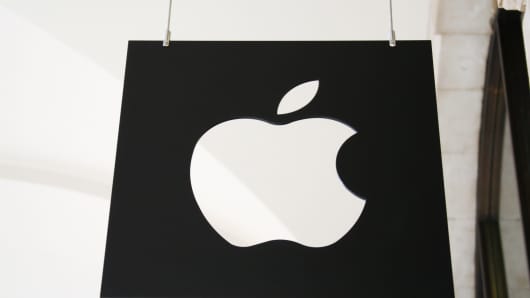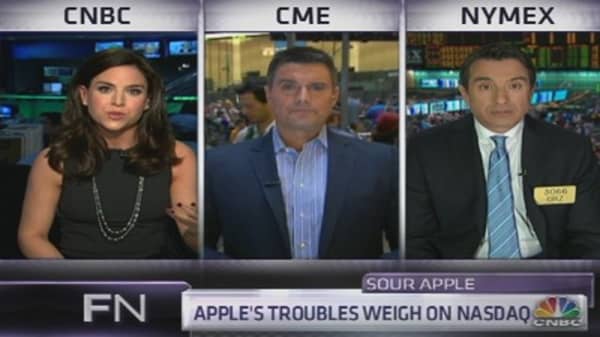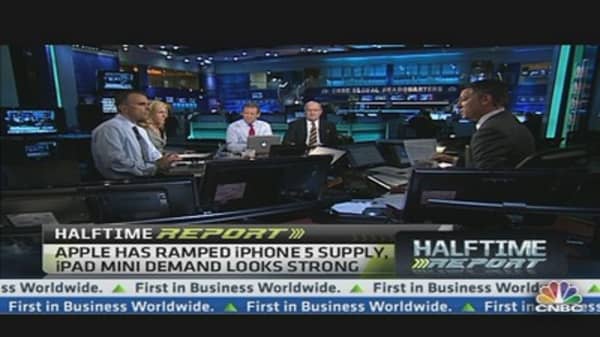Apple shares reversed earlier losses in volatile trading Thursday, a day after logging its biggest one-day drop in four years, but some professional traders remain bearish on the technology stock.
Shares of the iPhone and iPad maker are down more than 20 percent from its all-time high of $705 in September, trading in bear market territory. Apple's chart is very close to forming a "death cross" — where the stock's 50-day moving average falls below the 200-day moving average. Technicians usually see the sign as a cue to sell.
To Douglas Kass, founder of fund manager Seabreeze Partners, the "bear case for Apple remains intact."
"A more competitive landscape will hurt margins. Apple's products are expensive in a world of slowing growth and the stock is expensive relative to other hardware companies," Kass wrote in an email to CNBC's "Futures Now," adding he got long Apple around $520 for a trade and sold it at $575, only to re-short the stock at the $590 level. "We have morphed from the NBA Market (Nothing but Apple) to the ABA Market (Anything but Apple)."
From the floor of the Chicago Mercantile Exchange, professional trader Rich Ilczyszyn contended that Apple's stock has likely topped out at $700 a share.
"Unless they come out with some new product next year or the year after in the new product cycle, they could run the way of Sony," said Ilczyszyn, founder and chief market strategist of iiTrader, referring to how the Tokyo-based company had much success with its Walkman line of portable audio cassette players during the 1980s and 1990s, but has since struggled to keep its product line competitive. "If they don't keep up with new products, perhaps the top is in [for Apple]."
Whether it's tablets or smartphones, Anthony Grisanti of GRZ Energy said there's no question Apple faces increased competition.
"I think the competition alone warrants Apple being a lot less than where it is right now," Grisanti said from the New York Mercantile Exchange. "It's an expensive stock with expensive products."
In turn, Grisanti said that because Apple accounts for 20 percent of the Nasdaq, he sold the E-Mini Nasdaq 100 at $2,650 with a stop at $2,670 and a target of $2,600.
Earlier on CNBC, however, some traders played down Apple's losses as nothing more than year-end selling. Joe Terranova, chief market strategist at Virtus Investment Partners, recently sold 25 percent of his position in Apple on the same day he called it a "generational buy."
"A lot of the reasoning behind shaving the position had nothing to do with the fundamentals of Apple. It had more to do with the frustrations that I think the market is feeling with the 'fiscal cliff,'" said Terranova, referring to how American investors are worried about whether lawmakers can make a budget deal to avert the automatic spending cuts and tax hikes that analysts say could stoke a recession. "It is a proxy for the market. … I don't think this has anything to do with the fundamentals of Apple."
Terranova said he plans to hold his position of Apple until it reports its quarterly earnings.
















